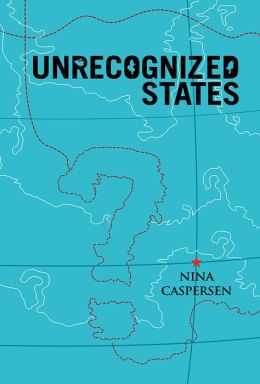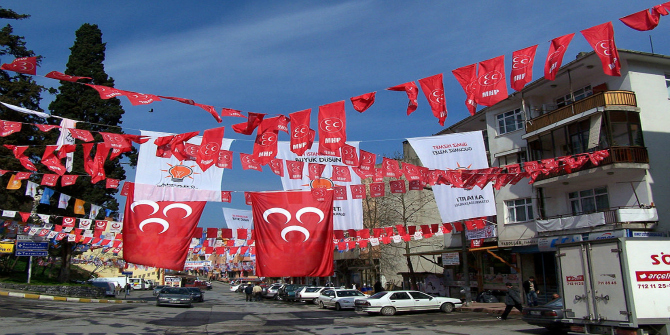 Unrecognized States aims to offer a much-needed and engaging account of the development of unrecognized states in the modern international system: state-like entities that have achieved de facto independence, but have failed to gain widespread international recognition. This book is an extremely interesting study and an invaluable addition to the literature on unrecognised states, writes James Ker-Lindsay.
Unrecognized States aims to offer a much-needed and engaging account of the development of unrecognized states in the modern international system: state-like entities that have achieved de facto independence, but have failed to gain widespread international recognition. This book is an extremely interesting study and an invaluable addition to the literature on unrecognised states, writes James Ker-Lindsay.

Until recently the subject of recognition received relatively scant attention amongst politics and international relations academics. Long the preserve of international law scholars, the topic was often seen as rather dry and pointless. However, in recent years, this perception has started to change with the emergence of a number of states that have yet to establish a firm and uncontested presence on the world stage.
At the more successful end of the scale is Kosovo. After having unilaterally declared independence in 2008, it is now recognised by the majority of UN members. In contrast, South Ossetia and Abkhazia have only been recognised by Russia and a handful of other countries. Then there are Nagorno-Karabakh and Transnistria, which have yet to be recognised by any UN members. Meanwhile, a number of other territories, such Kurdistan, seem poised to make a claim for full statehood in the years ahead. Against this backdrop, the subjects of secession and recognition are therefore becoming an ever more interesting area of study, especially as many of the seemingly arcane theoretical issues regarding statehood and recognition – such as the possibility of engaging with these states without recognising them – have become pressing questions for policy makers.
To date, the few works that have examined unrecognised states have tended to examine their place in the international system. The main focus has tended to be on questions relating to the ways in which external actors have interacted, or not, with unrecognised states and how unrecognised states have sought to engage with the wider world in the quest for legitimacy and acceptance. While some overview of their internal structures was usually included in these accounts, little attempt had been made to bridge the gap between our understanding of these entities as anomalies within the international system and their internal political structures and institutions. It is this glaring gap that this book addresses.
In this highly readable and succinct work, Nina Caspersen tackles a number of major questions relating to the emergence, development and continued existence of unrecognised states. After providing a historical background to the subject of secession, the book shows how unrecognised states face a very precarious existence that is largely dependent upon support from a patron state; a state of affairs that has led some to terms them ‘states on the dole’.

However, it is the next chapters, which examine external and domestic factors shaping state building in unrecognised states, are where the book really comes into its own. In Chapter 4, the work explores the roles of external actors in political development, including the parts played by patron and parent states, diaspora communities and other parties, such as international organisations. In this context, a particularly interesting topic is the notion of earned sovereignty and the way in which some actors, such as the European Union, have sought to introduce more stringent conditions for recognition than the traditional Montevideo criteria of a defined territory, fixed population and effective governance. As the author notes, this has actually helped to spur democratisation in many of these entities. And yet, in the very next chapter, which explores internal state building processes, the author highlights the way in which the need for national unity in the face of an ongoing existential threat from the parent state and isolation from the world at large often serves to dull political pluralism. Thus non-recognition can not only drive democratisation, it can also hinder it.
Moving on from this, the book next examines whether our understanding of unrecognised states forces us to rethink our understanding of sovereignty and statehood. Here it wades into highly controversial territory concerning the relationship between recognition and the very essence of statehood. As is stated on page 121, ‘Lack of recognition does not render statehood impossible or meaningless, but the resulting statehood differs in important respects from recognized statehood.’ This is an absolutely crucial remark inasmuch as it would seem to challenge the traditional legal view that statehood is not contingent on recognition; the declaratory theory of statehood. Instead, it rather seems to support the constitutive view that recognition is a key determinant of statehood. In other words, unrecognised states should be thought of as being objectively different from recognised states.
Finally, the work tackles the future of unrecognised states. In some case, they face the very real possibility of being forced back under the sovereignty of the ‘parent’ state through military means, as happened in the case of the Republika Srpska Krajina in Croatia (a case Caspersen knows particularly well) or Tamil Eelam in Sri Lanka. In other cases, it seems as if the only real prospect they face is ‘long term non-recognition’, with all that this entails. Meanwhile, some others may yet achieve widespread recognition and eventual admittance to the United Nations. Regardless of what the future holds for these territories, the author makes a good case for engaging with them. In so many ways, isolation is indeed a poor policy choice; not just in terms of conflict management but also from a humanitarian perspective.
Overall, this book is an extremely interesting study and an invaluable addition to the literature on unrecognised states. Empirically rich in its approach, it successfully creates a much needed theoretical link between our understanding of unrecognised states as actors in the international system and our understanding of the internal political dynamics of these secessionist entities. For anyone seeking to join the community of scholars working on what is a fascinating field this book is a required text.
————————————-
James Ker-Lindsay is Eurobank Senior Research Fellow in the Politics of South East Europe at the European Institute, London School of Economics and Political Science. His books include Kosovo: The Path to Contested Statehood in the Balkans (I.B.Tauris, 2009), The Cyprus Problem: What Everyone Needs to Know (Oxford University Press, 2011) and The Foreign Policy of Counter Secession: Preventing the Recognition of Contested States (Oxford University Press, 2012). He is on Twitter @JamesKerLindsay. Read more reviews by James.







